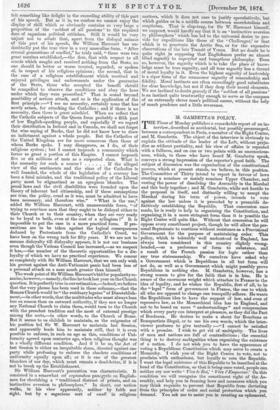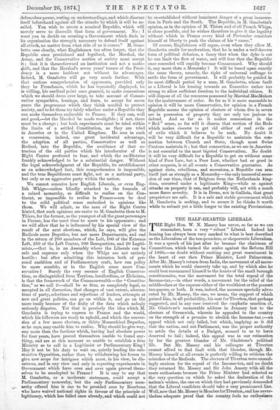M. GAMBETTA'S POLICY.
Times of Monday publishes a remarkable report of an in- terview, described as accidental, but possibly prearranged, between a correspondent in Paris, a member of the Right Centre, and M. Gambetta. The object of the interview is obviously to explain the attitude of the leader of the Left, without preju- dice as without partiality, and his view of affairs is repeated with a fullness, and on one or two points with an unconscious- ness, which, to those who have heard M. Gambetta speak, conveys a strong impression of the reporter's good faith. The subject of discussion was the organisation of the constitutional powers, which at present stands, we believe, in this position. The Committee of Thirty intend to report in favour of laws creating a nominee or mainly nominee Upper Chamber, and vesting the power of dissolving the Assembly in the Marshal and this body together ; and M. Gambetta, while not hostile to the proposal in itself, and distinctly willing to accept the Marshal during his term of power, intends to vote against the law unless it is preceded by a preamble de- finitively establishing the Republic. That concession once made, he is ready to help in organising the Constitution, and organising.it in a more stringent form than it is possible the Right Centre will quite like. Without that concession he will oppose every constituent project, though he will allow the per- sonal Septennate to continue without resistance as a Provisional Government for the purpose of maintaining order. This policy, which is tolerably well understood in England, has always been considered in this country slightly wrong- headed,—as a preference of form to substance, and a result of the French passion for logic rather than any true statesmanship. We ourselves have asked why a Government which is Republican in all but form will not do, as well as a Government which might possibly prove Republican in nothing else. M. Gambetta, however, has a strong reason to give for the faith that is in him. He is aware of the enormous weight which attaches in France to the idea of legality, and he wishes the Republic, first of all, to be the " legal " form of government in France, the one to which all who are opposed to change can tranquilly adhere. He wants the Republican idea to have the support of law, and even of repressive law, as the Monarchical idea has in England, and not to be based on mere " understandings " and compromises which every party can interpret at pleasure, as they did the Pact of Bordeaux. He desires to make a shout for Bourbons or Bonapartists illegal, or to use his own words, which the inter- viewer professes to give textually :—" I cannot be satisfied with a promise. I wish to get rid of ambiguity. The lives of men and nations are full of contradictions ; the essential thing is to destroy ambiguides when organising the existence of a nation. I do not wish you to have the appearance of voting a Republican Constitution which may serve to create a Monarchy. I wish you-of the Right Centre to vote, not to proclaim with enthusiasm, but loyally to vote the Republic. I want the legal existence of this Republic to be inscribed at the head of the Constitution, so that it being once voted, people can neither cry nor write.' Vive le Roi," Vive l'Empereur.' On this condition we will recognise the constituent right of the As- sembly, and help you in framing laws and measures which you may think requisite to prevent that Republic from deviating from the principles of order and social protection which you demand. You ask me to assist you in creating an ephemeral,
defenceless power, resting on understandings, and which disarms itself beforehand against all the attacks by which it will be as- sailed. You wish to create a nominal Republic, which will merely serve to discredit that form of government. No ; I want you to decide on creating a Government which finds in its organisation the strength necessary to defend itself against all attack, no matter from what side of us it comes." M. Gam- betta sees clearly, what Englishmen too often forget, that the Republic once proclaimed and legalised, the Marshal, the Army, and the Conservative section of society must accept it ; that it is thenceforward an institution and not a make- shift, and that the Marshal's seven years' tenure of the Presi- dency is a mere incident not without its advantages. Indeed, M. Gambetta will go very much farther. With that curious comprehension of opponents, provided only they be Frenchmen, which he has repeatedly displayed, he is willing, his cardinal point once granted, to make concessions which we should deem over large, to take account of Conser- vative sympathies, leanings, and fears, to accept for seven years the programme which they think needful to protect society, and to let them try fairly whether under a Republic they can make themselves endurable to France. If they can, well and good,—let the Marshal be made re-eligible ; if not, there must be a change ; but both experiments must be tried within the limits of a settled Constitution, as they are tried in America or in the United Kingdom. He sees in such a concession, indeed, one great incidental advantage, the adoption of all parties, Conservative as well as Radical, into the Republic, the avoidance of that os- tracism of the old parties which his interlocutor of the Right Centre professed to fear, and which the ex-Dictator frankly acknowledged to be a substantial danger. Without the legal acknowledgment of the Republic, its establishment as an acknowledged fact, this comprehension is impossible, and the true Republicans must fight, not as a national party, but only as an aggressive party within the nation.
We cannot conceive how English Liberals, or even Eng- lish Whigs—unless blindly attached to the formula of a mixed monarchy, so difficult to realise on the Con- tinent, so impossible to realise in France-,3-can be deaf to the solid political sense embodied in opinions like these. We will adinit, as the man of the Right Centre hinted, that such opinions are easier to M. Gambetta than to M.
Thiers, for the former, as the youngest of all the great personages in France, has the most time to spare to his opponents ; and we will allow that he is influenced by his special view of the result of the next elections, which, he says, will give the Radicals more Deputies, but not more Departments, and end
in the return of 280 members of the Left, 100 of the Extreme Left, 250 of the Left Centre, 100 Bonapartist/3, and 20 Legiti- mists,—that is, in an Assembly where the Liberals can be safe and supreme only when the Whigs are not entirely hostile ; but after admitting this intrusion both of per- sonal ambition and of Parliamentary craft, how can policy be more sensible, •or in the English sense more Con- servative ? Surely the very essence of English Conserva- tism, as distinguished from Toryism, landlordism, or Elchoism, is that the framework of the Commonwealth—the " Constitu- tion," as we call it—shall be so firm, so completely legal, so accepted in all discussion, that changes of vast extent, alterna- tions of party, selections and rejections. of leaders, attempts at new and great policies, can go on within it, and go on the more 'easily because of the fixity of the data which nobody seriously disputes. Yet that is precisely the idea which M. Gambetta is trying to express to France and the world, which his followers are ready to uphold, and which the conver- sion of a few more electors, or thiity Monarchical Deputies, as he says, may enable him to realise. , Why should he give way, any more than the factions which, having had absolute power for four years, have proved themselves unable to found any- thing, and are at this moment as unable to establish a firm Ministry as to call in a Legitimist or Parliamentary King May it not be his duty to wait on, quietly leading the sub- stantive Opposition, rather than by withdrawing his forces to give new scope for intrigues which must, in his view, be dis- astrous, and in any view end only in repeating experiments in Government which have over and over again proved them- selves to be unadapted to France ? It is easy to say that M. Gambetta, as a moderate statesman, could accept a Parliamentary monarchy, but the only Parliamentary mon- archy offered him is one to be presided over by Bourbons who have waived national rights in favour of the principle of legitimacy, which has failed once already, and which could not be re-established without imminent danger of a great insurrec- tion in Paris and the South. The Republic, in M. Gambetta's opinion, as in the opinion of M. Thiers and of all French Whigs, is alone possible, and he wishes therefore to give it the legality without which in France every kind of Pretender considers himself at liberty to push the claims of his " cause.", Of course, Englishmen will argue, even when they allow M. Gambetta credit for moderation, that he is under a well-known form of political delusion, a fancy that when the dyke is out he can limit the flow of water, and will fear that the Republic once conceded will rapidly become Communard. Why should it, any more then a Monarchy ? It will be based upon exactly the same theory, namely, the right of universal suffrage to settle the form of government. It will probably be guided in its most difficult period by a man, M. Gambetta, whose fault as a Liberal is his leaning towards an Executive rather too strong to allow sufficient freedom to the individual citizen. It will dispose of all the resources possessed by Marshal MacMahon for the maintenance of order. So far as it is more amenable to opinion it will be more Conservative, for opinion in a French Republic means the opinion of electors of whom five in seven are in possession of property they are only too jealous to defend. And so far as it makes concessions in the " Red" sense, so far will it disarm that section of the Reds which makes en' zeutes to get rid either of real evils or of evils which it believes to be such. No doubt it will be very difficult for a Republic to maintain the con- nection between Church and State, though most Swiss Cantons maintain it ; but that connection, as we see in America is not essential to the most bigoted Conservatism. No doubt it will be very difficult for a Republic to get on without some kind of Poor Law, but a Poor Law, whether bad or good in other respects, is at all events a Conservative guarantee. As against riots, rebellions, and secessions, a Republic can arm itself just as strongly as a Monarchy—the only successful seces- sion of our time, that of Belgium from the Netherlands king- dom, occurred under a legitimate King—while as against attacks on property it can, and probably will, act with a much more fierce severity. It is in Berne, not in Galicia, that great proprietors are safe. It is a safe and stable government which M. Gambetta is seeking, and to secure it he thinks it worth while to submit yet a little longer to the existing Provisorium.



































 Previous page
Previous page